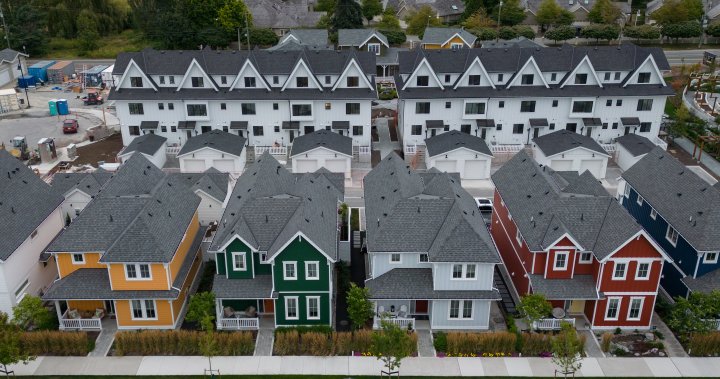Canadian youth are prioritizing their efforts to break into the housing market over other traditional markers of adulthood like getting married, according to a survey released Wednesday from RBC.
The results show homeownership remains an aspiration despite affordability barriers boxing out many of the youngest generation.
Some 78 per cent of single or unmarried first-time homebuyers under 30 said they’re prioritizing saving for a home, up from 70 per cent of those above the age of 30, according to the report.
For 40 per cent first-time buyers under 30 years old, owning a home is seen as a critical part of their five-year plan. That outranks buying a car (33 per cent), travel (30 per cent) and getting married (24 per cent).
The findings come from RBC’s survey via Cint of 1,000 Canadian adults between June 27 and July 3.
Those priorities come up against the realities of Canada’s unaffordable housing market.
While the Bank of Canada has embarked on an easing cycle that’s set to lower borrowing costs in the months to come, high home prices and elevated interest rates have made it harder for homebuyers to qualify for mortgages in recent years.

Ipsos polling conducted exclusively for Global News after the central bank’s first 25-basis-point rate cut in June showed 45 per cent of respondents felt they’d never be able to afford a home, no matter how much interest rates dropped. Some 78 per cent indicated that owning a home in Canada was a privilege reserved only for the rich.

Get weekly money news
Get expert insights, Q&A on markets, housing, inflation, and personal finance information delivered to you every Saturday.
Housing affordability improved somewhat nationally in the second quarter of the year as borrowing costs fell more than home prices appreciated, according to a report last week from National Bank of Canada.
That marked the second consecutive quarter of improving conditions for homeowners, but National Bank economists noted that overall affordability is still hampered by relatively high mortgage costs.
“Looking ahead, falling mortgage interest rates will likely be the main driver for improvements in affordability,” the report stated.
Some 72 per cent of those under 30 in the RBC survey said reports about the state of the housing market make it look “unattainable.” But a similar number, 71 per cent, said they believe homeownership will be an important part of their retirement plan.
Karen Starns, the CEO of RBC’s housing-focused offshoot Houseful, said in a statement accompanying the report that the findings suggest getting a foothold in the housing market is viewed as a first step that can give youth the “flexibility to pursue other life milestones.”
Some 72 per cent of savers under 30 are putting away some of their monthly income towards buying a first home, the survey found, compared with fewer than half (47 per cent) over 30 years old.
Among those who are able to break into the housing market, a growing number are increasingly relying on help from family, a separate report from CIBC earlier this summer found.
The data showed 31 per cent of first-time homebuyers have received financial help from family members in roughly the first half of 2024, compared with 20 per cent in all of 2015. The amount of money they received rose to $115,000 on average, a 73 per cent increase above 2019 levels.
— with files from Global News’ Nathaniel Dove
Are you hoping to break into the housing market this fall? Global News would like to hear about the challenges you’re facing and the strategies you’re using to buy your first home. Fill out the form below and we might reach out for a future story on housing affordability.
© 2024 Global News, a division of Corus Entertainment Inc.





